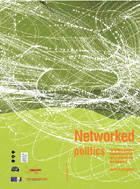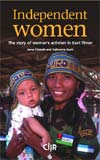
Le portail rinoceros d’informations sur les initiatives citoyennes pour la construction d’un autre monde a été intégré au nouveau site Ritimo pour une recherche simplifiée et élargie.
Ce site (http://www.rinoceros.org/) constitue une archive des articles publiés avant 2008 qui n'ont pas été transférés.
Le projet rinoceros n’a pas disparu, il continue de vivre pour valoriser les points de vue des acteurs associatifs dans le monde dans le site Ritimo.
Pages 1 | 2 | 3 | 4 | 5 | 6 | 7 | 8 | 9
Networked politics : rethinking political organisation in an age of movements and networks work in progress
> Amsterdam, January 2007, 72 p. (pdf)
Networked Politics is the product of a collaborative research process for rethinking political organisation in an age of movements and networks. In a world where the traditional institutions of democratic control have been weakened by an unconstrained global market and superpower military ambitions, it uncovers diverse forms of resistance with the potential to create new institutions for social change. The authors set out the principles upon which such transformations should be based, and the challenges that stand in the way of their realisation.
The discussion is then pursued along four interrelated lines of inquiry. These examine social movements, including their development of new forms of knowledge and organisation ; progressive political parties, and attempts to bring about transformative forms of political respresentation ; the dangers and opportunities facing the development of political institutions in a network society ; and the potential of new techno-political tools for facilitating and reconceiving political organisation. A series of case studies are also offered, drawing critical lessons from the experience of the German Green Party ; the 2006 French mobilisation against the controversial CPE employment law ; and an extended discussion on « open source as a metaphor for new institutions ».
,
Independent women : the story of women’s activism in East Timor
> Progressio, 2005, £11.95
The story of women’s activism in East Timor with comparative chapters on Cambodia, Mozambique and Namibia.
This book tells the story of how East Timorese women activists mobilised against a patriarchal society and claimed their right to participate in their new independent and democratic nation.
Drawing on personal research and extensive interviews with women activists in East Timor, the authors explore the history and contribution of the East Timorese women’s movement during and after the Indonesian occupation. They examine the growing influence of the women’s movement as the country moved into independence, and analyse the key challenges facing East Timorese women in their ongoing quest for rights and greater political participation.
The book includes comparative chapters by expert guest authors on the lessons to be drawn from women’s experiences in Cambodia, Mozambique and Namibia - countries which have also experienced the transition from an extended period of conflict to eventual independence.
World Report 2007
> 2007, 568 p.
Human Rights Watch launched its World Report 2007 on Guantanamo Anniversary (January 11, 2007). With US credibility undermined by the Bush administration’s use of torture and detention without trial, the European Union must fill the leadership void on human rights said Human Rights Watch in releasing its World Report 2007.
This report is Human Rights Watch’s seventeenth annual review of human rights practices around the globe. It summarizes key human rights issues in more than 70 countries worldwide, drawing on events through mid-November 2006. Each country entry identifies significant human rights issues, examines the freedom of local human rights defenders to conduct their work, and surveys the response of key international actors, such as the United Nations, European Union, Japan, the United States, and various regional and international organizations and institutions.
- Read online Human Rights Watch World Report 2007
People, land and water
> Edited by Guy Bessette, Participatory Development Communication for Natural Resource Management, 2006, 324 p.
Poverty alleviation, food security and environmental sustainability are closely linked and represent major development challenges for all actors involved in the field of natural resource management. Poverty alleviation requires sustained economic growth, but it is also necessary to ensure that the poor benefit from that growth. Efforts must also be made to improve food security by providing conditions of access and proper utilization by the poor.
Promoting environmental sustainability includes challenging goals such as fighting land degradation (especially desertification), halting deforestation, promoting proper management of water resources through irrigation schemes and protecting biodiversity. All these activities must be designed and implemented with the active participation of those families and communities who are struggling to ensure their livelihood in changing unfavourable environments. But they must also include other stakeholders who are playing or can play a role in these changes : government technical services, nongovernmental organizations (NGOs), development projects, rural media, community organizations and research teams. Finally, local and national authorities, policy-makers and service providers must also be involved in shaping the regulatory environment in which the required changes will take place.
- Read online People, land and water
The media and the Rwanda genocide
> Edited by Allan Thompson, 2007, 480 p.
The news media played a crucial role in the 1994 Rwanda genocide : local media fueled the killings, while the international media either ignored or seriously misconstrued what was happening.
This is the first book to explore both sides of that media equation. The book examines how local radio and print media were used as a tool of hate, encouraging neighbours to turn against each other. It also presents a critique of international media coverage of the cataclysmic events in Rwanda. Bringing together local reporters and commentators from Rwanda, high-profile Western journalists, and leading media theorists, this is the only book to identify and probe the extent of the media’s accountability. It also examines deliberations by the International Criminal Tribunal for Rwanda on the role of the media in the genocide.
This book is a startling record of the dangerous influence that the media can have when used as a political tool or when news organizations and journalists fail to live up to their responsibilities. The authors put forward suggestions for the future by outlining how we can avoid censorship and propaganda, and by arguing for a new responsibility in media reporting. The book includes an opening statement from Kofi Annan and an introduction by Senator Roméo Dallaire.
- Read online The media and the Rwanda genocide
© rinoceros - Ritimo in partnership with the Fph via the project dph and the Ile de France region via the project Picri. Site developed using SPIP, hosted by Globenet. Legal mentions - Contact






